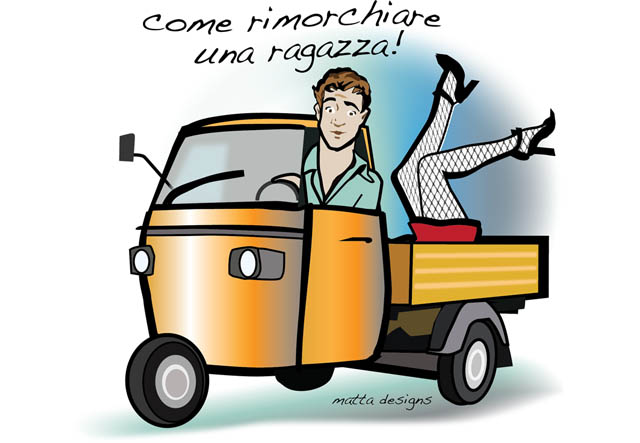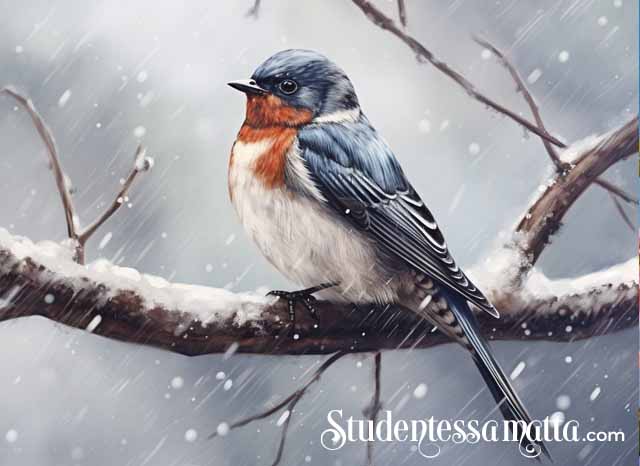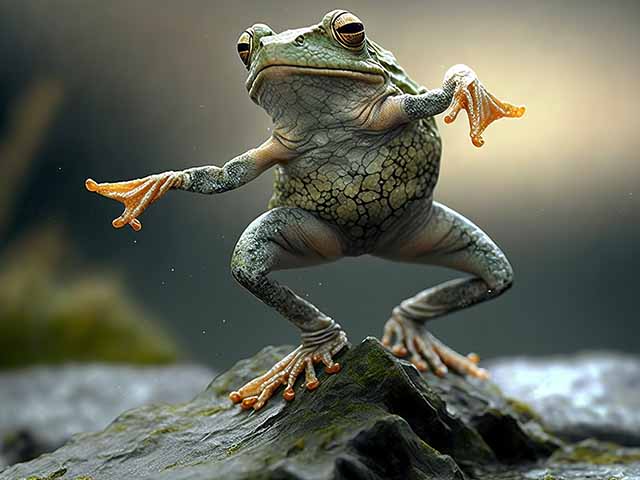
Espressioni idiomatiche italiane che coinvolgono: rane e rospi.
Jump into Italian idioms involving our little web-footed friends — frogs and toads.
Perché ingoiare un rospo? Scopriamolo insieme!
Why Swallow a Toad? Let’s Find Out!
Oggi mi tuffo in alcuni modi di dire vivaci che saltano fuori direttamente dalla lingua! Queste espressioni con rane e rospi daranno sicuramente una marcia in più al tuo passo e catapulteranno le tue abilità conversazionali a un livello superiore.
Today, I’m diving into some lively idioms that leap right off the tongue! These expressions featuring frogs and toads are sure to add a bounce to your step and catapult your conversation skills to the next level.
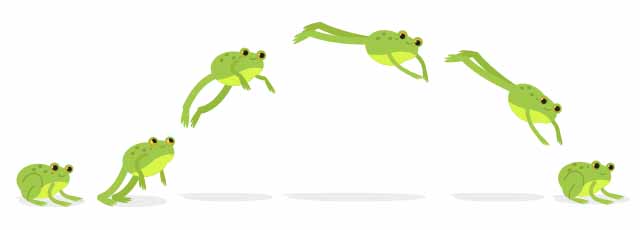
Iniziamo con una descrizione di queste creature anfibie.
Let’s start with a description of these amphibious creatures.
Denominazione comune di varie specie di piccoli anfibi con corpi tozzi e pelle bruno-verdastra coperta spesso di dossi. Alcune specie hanno lunghe lingue per prendere insetti volanti, gambe lunghe e piedi palmati per aiutarli a nuotare meglio.
Common names of various species of small amphibians with stocky bodies and brown-greenish skin often covered with bumps. Some species have long tongues to capture flying insects, long legs, and webbed back feet to help them swim better.
Rospo = Toad
Rana = Frog
Ranocchio = Frog
Espressioni notevoli / Notable expressions
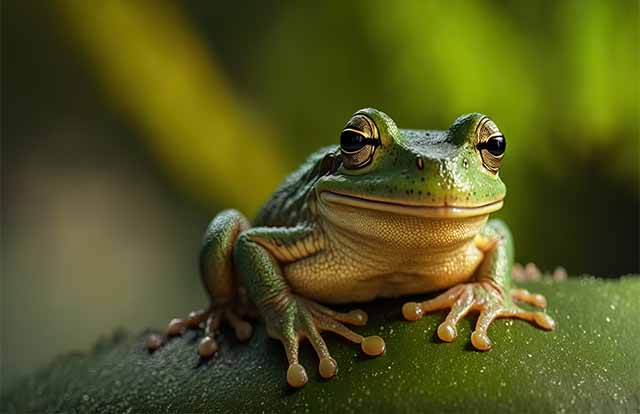
Essere un rospo ———> To be a toad
Essere burberi, scontrosi e scostanti; assumere toni sgarbati, scortesi e così via, ricordando così la voce e l’atteggiamento sgraziato dei rospi.
Common names of various species of small amphibians with stocky bodies and brown-greenish skin often covered with bumps. Some speBe gruff, grumpy, and unfriendly; take on rude, rude tones, and so on, thus reminding the voice and awkward attitude of toads.cies have long tongues to capture flying insects, long legs, and webbed back feet to help them swim better.
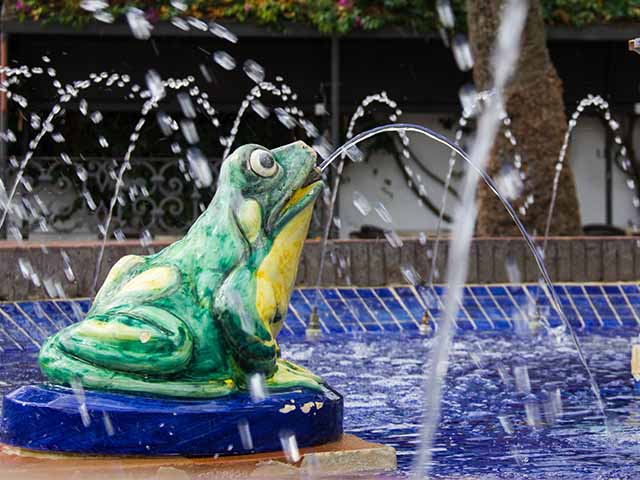
Sputare il rospo! ———> Spit out toad (spit it out!)
Confessare, parlare. Decidersi a parlare di qualcosa che non si intendeva dire per timore, per scrupolo, per pudore e così via, e che in ogni caso costituisce motivo di malumore, preoccupazione, sofferenza e simili.
“To spill the beans” or “Spit it out!” To confess, to speak. Deciding to talk about something that was not meant to be out of fear, out of scruple, out of modesty, and so on, which in any case constitutes a cause of bad mood, concern, suffering, and the like.

Ingoiare il rospo ———> Swallow the toad
Si usa per descrivere qualcuno o qualcosa di molto poco attraente, sottolineando il loro aspetto fisico in modo umoristico o esagerato
It’s used to describe someone or something very unattractive, emphasizing their physical appearance in a humorous or exaggerated way.

Brutto come un rospo ———> Ugly as a toad
Si usa per descrivere qualcuno o qualcosa di molto poco attraente, sottolineando il loro aspetto fisico in modo umoristico o esagerato
It’s used to describe someone or something very unattractive, emphasizing their physical appearance in a humorous or exaggerated way.

Rana in gola ———> To have a frog in your throat.
Avere difficoltà a parlare perché la gola si sente secca e si vuole tossire.
To have difficulty speaking because your throat feels dry and you want to cough.
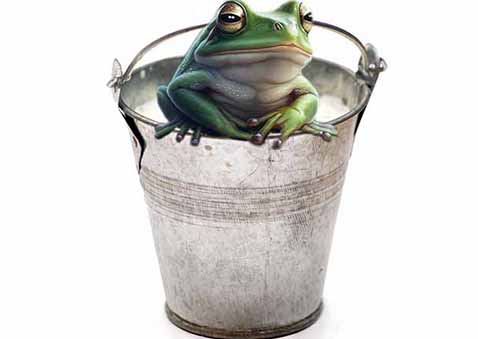
Grossa rana in un piccolo stagno —-> Big frog in a small swamp
Una persona molto conosciuta o importante in un piccolo gruppo di persone ma che non è conosciuta o importante al di fuori di quel gruppo
A well-known or important person in a small group but not known or essential outside that group.

Il Principe ranocchio ———> The frog prince
La fiaba è estremamente popolare e l’espressione “baciare un ranocchio” viene usata comunemente con una quantità di significati metaforici. In genere, la trasformazione da ranocchio a principe viene paragonata al cambiamento di una persona che scopre il vero amore.
The fairy tale is extremely popular, and “kissing a frog” is commonly used with several metaphorical meanings. Typically, the transformation from frog to the prince is compared to the change of a person discovering true love.

Baciare un ranocchio ———> to kiss a frog
La fiaba è estremamente popolare e l’espressione “baciare un ranocchio” viene usata comunemente con una quantità di significati metaforici. In genere, la trasformazione da ranocchio a principe viene paragonata al cambiamento di una persona che scopre il vero amore.
The fairy tale is extremely popular, and “kissing a frog” is commonly used with several metaphorical meanings. Typically, the transformation from frog to the prince is compared to the change of a person discovering true love.
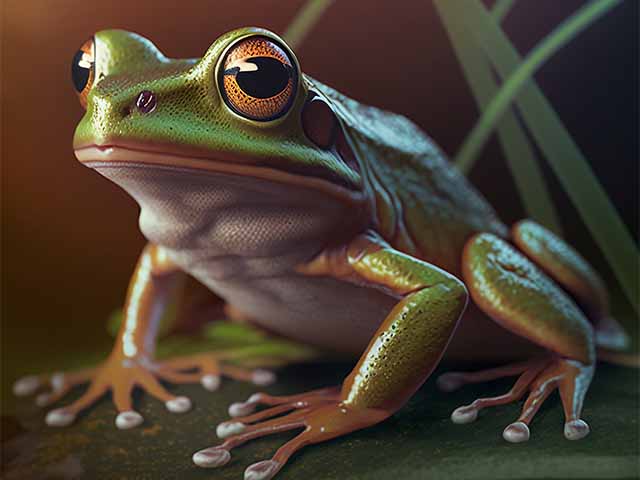
Filastrocca del rospo
Nursery rhyme of the toad
Mi prendono
come esempio
di bruttezza.
Che importa?
Ci sono abituato.
Sperano
che un bacio
mi trasformi
in principe,
ma un principe
viene per forza amato?
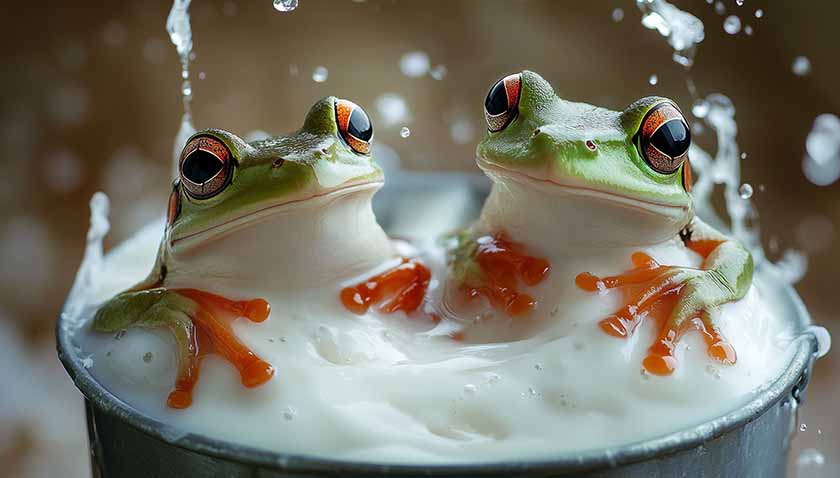
Una Piccola Storia per Ricordare “Lasciare” e “Mollare”
A Little Story to Remember “Lasciare” and “Mollare”
Due rane cadono in un secchio di latte. Una di loro è pessimista e si arrende subito.
Two frogs fall into a pail of milk. One of them is a pessimist and gives up immediately. She says:
Dice: Non ho nessuna possibilità di sopravvivere. È meglio morire subito che soffrire inutilmente a lungo. Non ce la faccio più. Mi lascio andare.
He said: I have no chance of surviving. It’s better to die now than to suffer long and uselessly. I can’t go on. I give in.
Così, smette di nuotare e annega.
So, he stopped swimming and drowned.
L’altra rana, invece, è ottimista e pensa: In fondo, la situazione non è così male. C’è latte in abbondanza, quindi non morirò di fame! Dai, tutto andrà bene. Non devo mollare mai!
The other frog, however, is an optimist and thinks: After all, the situation isn’t so bad. There’s plenty of milk, so I won’t die of hunger! Come on, everything will be fine. I must never give up!
Così, piena di energia, inizia a nuotare, cantare e ballare. Nuota e canta.
So, full of energy, he began to swim, sing, and dance. Swim and sing.
Dopo mezz’ora di continuo movimento, il latte si trasforma in burro, e la rana ottimista riesce a salirci sopra e a salvarsi.
After half an hour of continuous movement, the milk turns into butter, and the optimistic frog climbs on it and saves himself.


